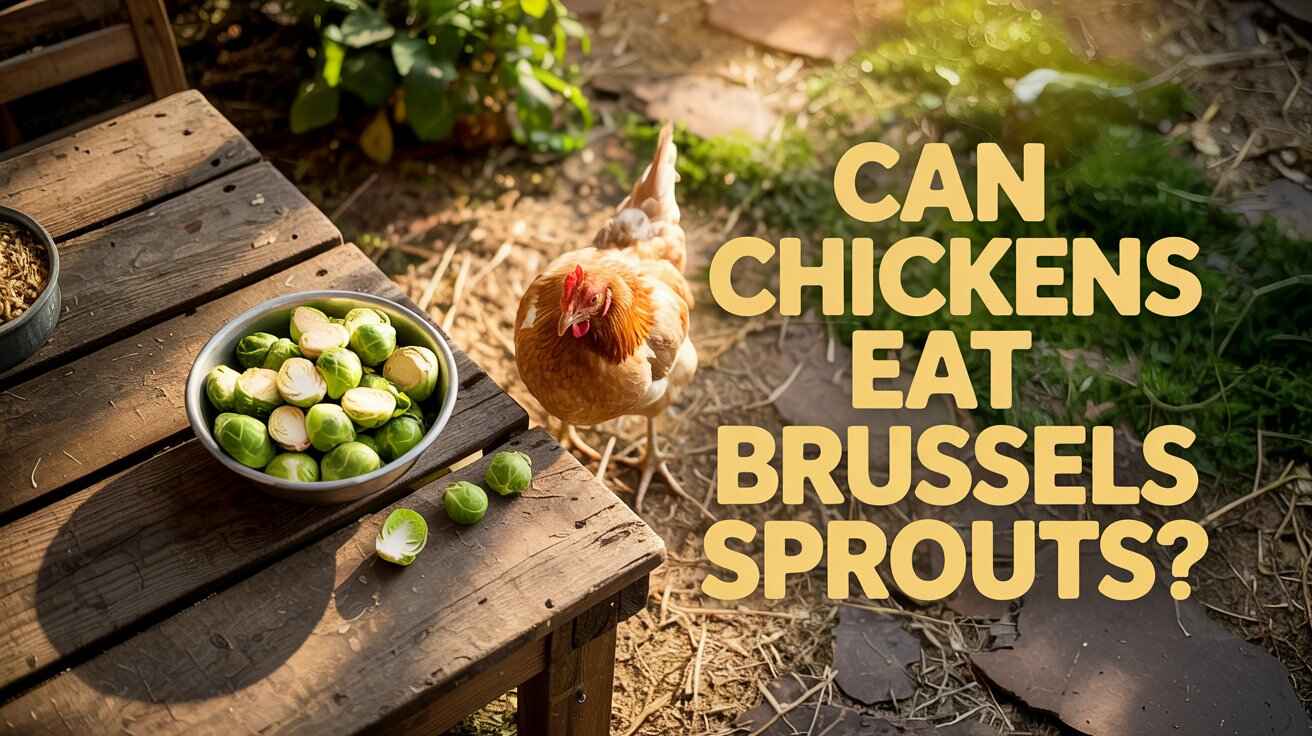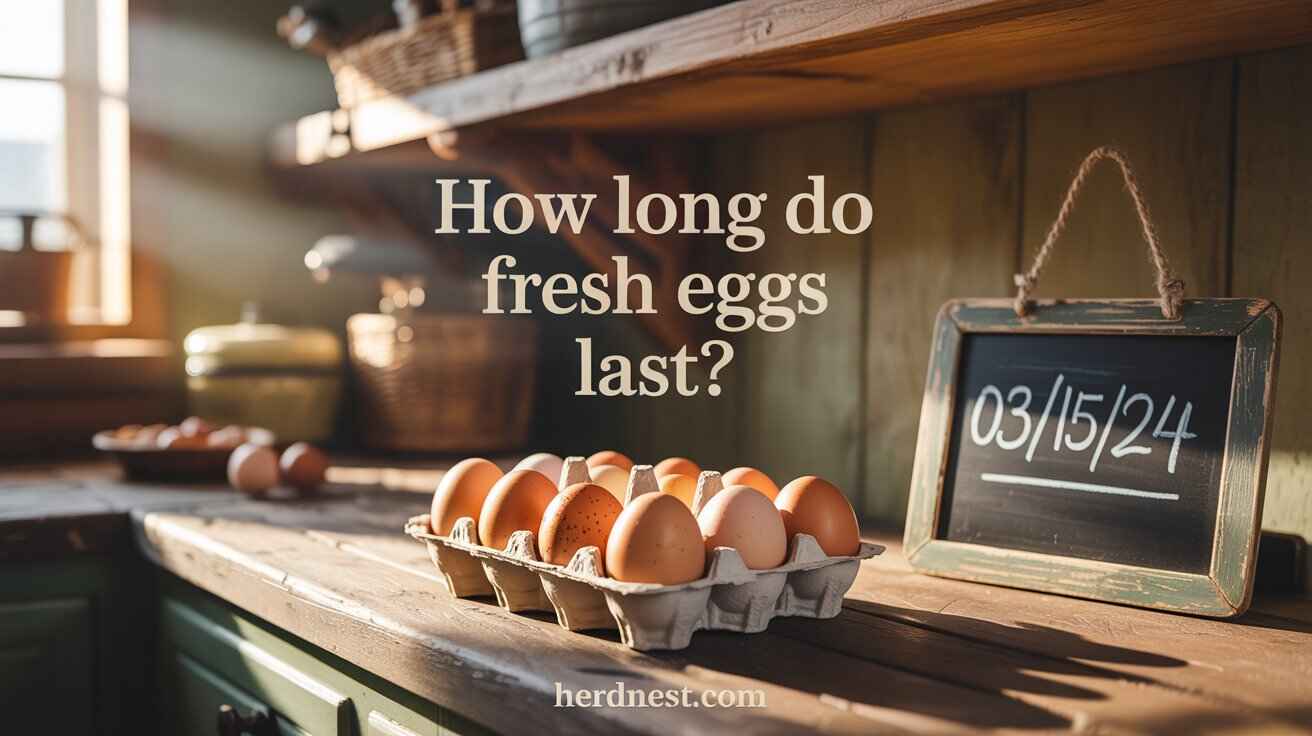Backyard chickens are not picky eaters. In fact, they’ll happily enjoy almost anything, whether it’s leftover vegetables, bits of table scraps, or even dirty puddle water.
As someone who’s raised chickens for a long time, I’ve often found myself googling random questions like, “Can they eat Brussels sprouts?” and every time, the answer surprises me. Chickens are natural omnivores, and while their diet revolves around grains and poultry feed, they benefit from a varied menu that mimics their foraging instincts.
When you’ve got extra sprouts after a garden harvest, it’s natural to wonder if your chickens would enjoy them too. The good news is that these little green vegetables are packed with nutrients and can provide several benefits.
While commercially produced feeds ensure their survival, a balanced diet with specific treats like Brussels sprouts can truly make your flock feel like real connoisseurs of fine dining.
However, just like any new food, you’ll want to introduce it in moderation to minimize any risks to their health. My chickens love scratching around the feeder for surprises, and seeing them peck at tiny sprouts is always a treat!
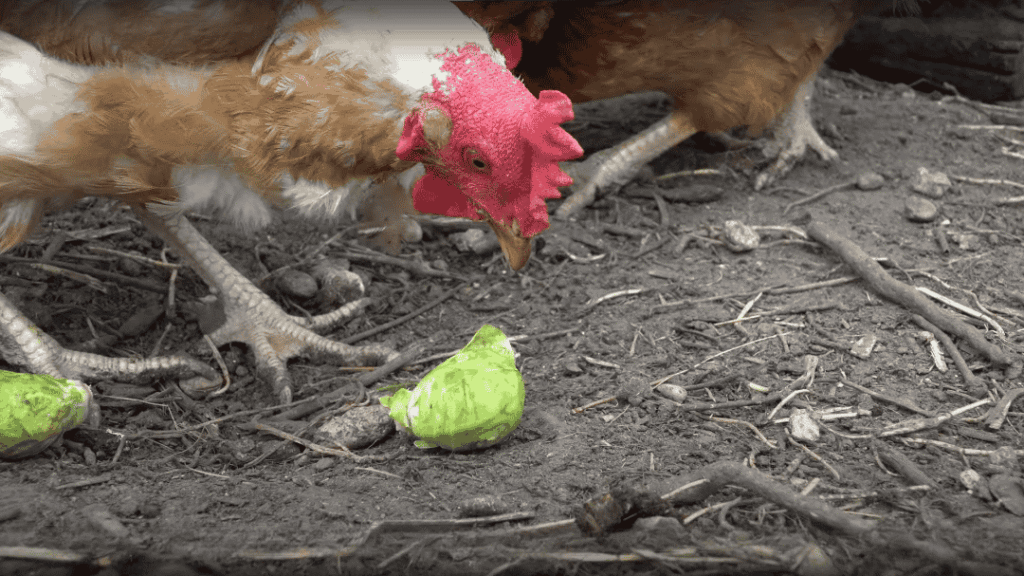
Table of Contents
ToggleAre Brussels Sprouts Safe for Chickens?
Yes, chickens can enjoy Brussels sprouts, those little green gems that are packed with vitamins, minerals, and antioxidants. They are particularly rich in Vitamin C and Vitamin K, which help boost the immune system and improve overall feather health in your feathered friends.
However, these treats should only be given in moderation to avoid any negative impact on their nutrition. Overloading their diet with extra fiber-filled foods like Brussels sprouts, while nutritious, can offset the balance of their commercial feed, which is specially formulated to include all the micro and macro nutrients your flock needs.
That said, be aware that like broccoli, cabbage, and other cruciferous vegetables, Brussels sprouts contain goitrogens. If fed in excess, these compounds can lead to avian goiter, a condition that enlarges the thyroid gland and causes symptoms like lethargy, depression, and weight loss.
For health and safety, it’s essential to monitor their intake and provide variety in their diets. Adding small amounts of napa cabbage, kale, or even cauliflower can ensure a diverse menu without risking their well-being. Always proceed with caution and follow the general rule—treats are fine, but should never replace their regular feed.
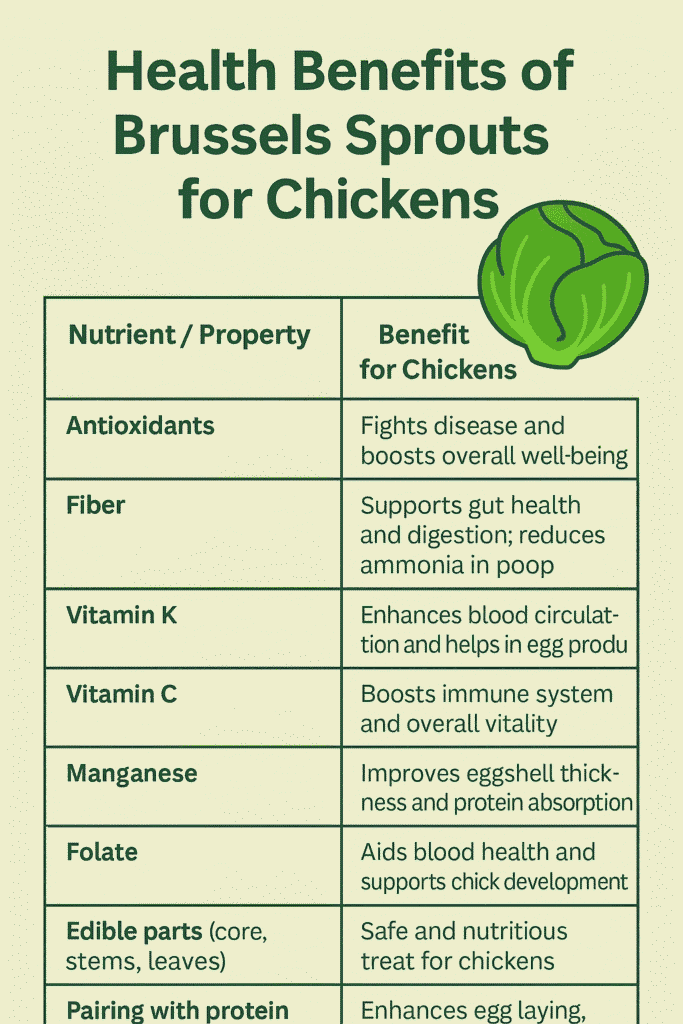
Health Benefits of Brussels Sprouts for Chickens
Brussels sprouts are a fantastic addition to your flock’s diet, offering a range of health-boosting advantages. Packed with antioxidants, these nutritious greens help fight off diseases and promote overall well-being in your feathered friends.
The high fiber content supports gut health and aids in digestion, ensuring your chickens stay hearty and active. Rich in essential vitamins like Vitamin K and Vitamin C, Brussels sprouts also enhance the immune system and encourage proper blood circulation. These benefits are especially important for hens, as they help produce healthy eggs and maintain quality egg production.
The cores, stems, and even the outer leaves of Brussels sprouts are all edible and make a delicious treat for chickens. These green leafy vegetables are an excellent source of minerals like manganese, which significantly impacts egg quality by improving the thickness of the eggshell and supporting proper protein absorption.
Additionally, the folate in these veggies aids in blood health and boosts the development of young chicks. Including fiber-rich foods like Brussels sprouts in their diet ensures better digestion and reduces ammonia in their poop, keeping their environment healthier.
For those looking for extra feed options, pairing Brussels sprouts with GrubTerra’s Black Soldier Fly Larvae can provide additional protein and nutrients.
This combination supports optimal egg laying, growth, and overall health in chickens. So, whether you’re saving the outer leaves from a batch of smoked Brussels sprouts or offering them raw, your chickens will adore this wholesome snack. Remember, a varied and balanced diet is key to supporting your flock’s metabolism, egg growth, and youthful energy.
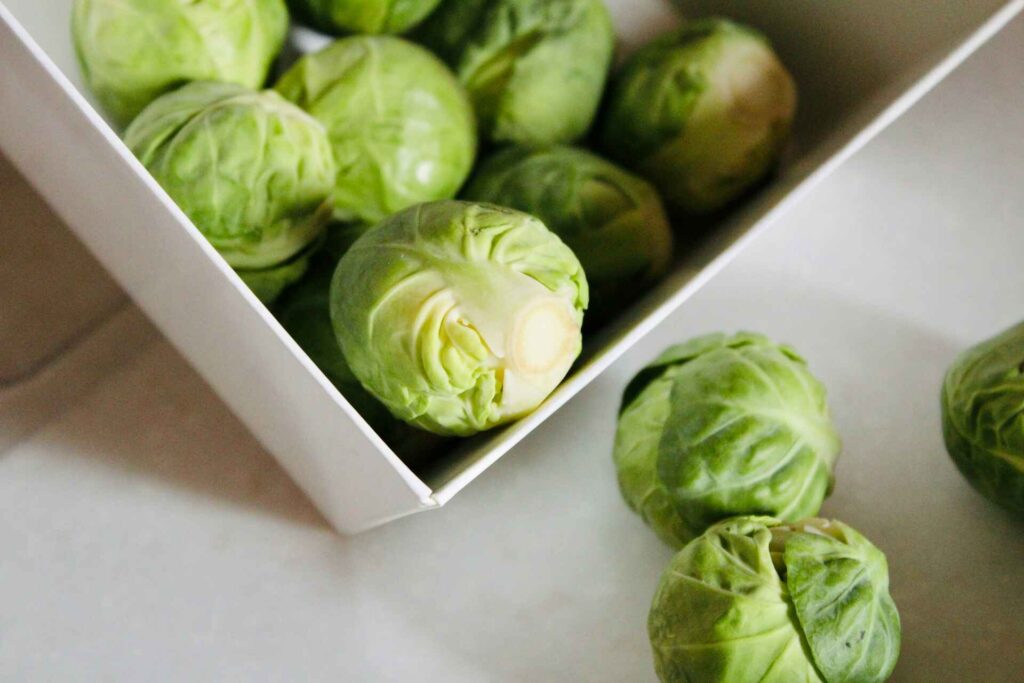
What Parts Of The Brussels Sprouts Plant Can Chickens Eat?
Chickens can eat the entire plant of Brussels sprouts, making it a versatile and edible treat for your flock. This includes the roots, stalks, leaves, and even the core. If you grow a no-till garden, allowing the soil to naturally decompose the roots, you can still offer the stems and leaves to your chooks as a nutritious option.
Additionally, they can enjoy entire heads of Brussels sprouts, even if slightly contaminated by cabbage worms. Chickens love to peck at these plants, making them a great way to add variety to their diet while also helping to break down leftover produce.
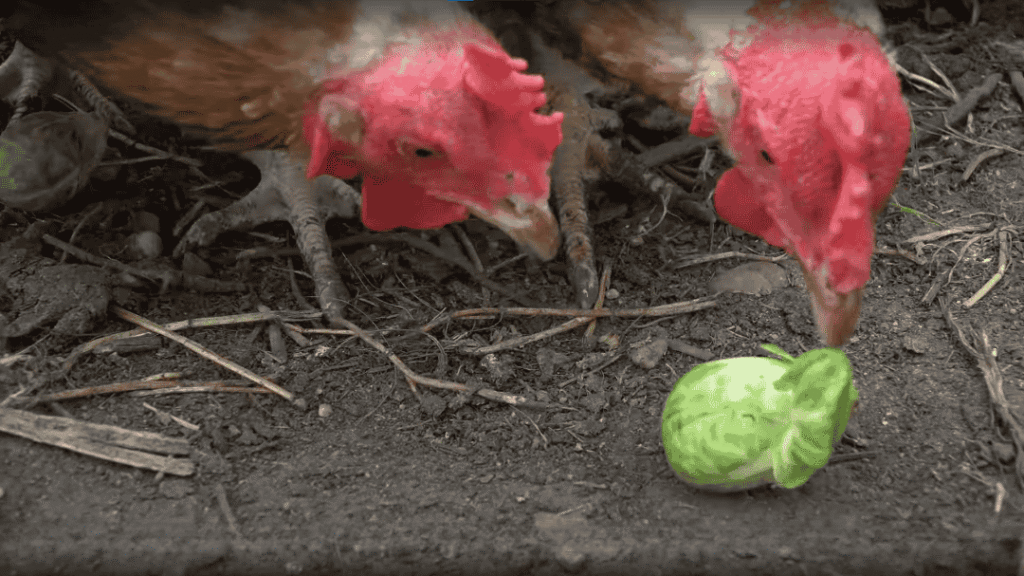
Feeding Chickens Brussels Sprouts
Feeding Brussels sprouts to your chickens is an easy way to add variety and nutrients to their balanced diet. Start by offering small quantities and observe how they react.
For raw sprouts, make sure to rinse them thoroughly and cut them into tiny pieces or use a food processor to make them more accessible. Due to their tough texture, some chickens may lose interest if the pieces are too large to peck apart piece by piece.
You can also mix raw sprouts with other vegetables, like carrots, sugar snap peas, or even fruits such as bananas and apples, to create an appealing sprout salad that adds flavor and a nutritional boost.
For a refreshing treat during summer months, you can offer frozen Brussels sprouts, which retain their nutritional value while acting as a cooling snack. Store them in the refrigerator and serve them cold to your flock.
If you prefer cooked Brussels sprouts, simply steam or pan-fry them with a little olive oil (but no seasoning like salt, as it’s toxic to chickens). Chopping them into bite-sized pieces, halves, or quarters will make it easier for your chickens to eat.
Additionally, always discard any rotten spots or moldy parts, and avoid serving leftover food that’s over three days old, as it can harm their health.
Don’t forget to provide grit along with their treats to aid the digestive system. Chickens need grit to break down food properly in their gizzards, especially when eating foods like grains or sprouts. For added enrichment, try stringing sprouts and hanging them up in the coop.
This fun activity acts as a boredom buster and keeps your feathered friends entertained while they enjoy their meal. Explore more feeding tips and diet options at GrubTerra’s blog to keep your flock happy and healthy.
Is Eating Too Many Brussels Sprouts Safe for Chickens?
Feeding Brussels sprouts to chickens is generally safe, but like all treats, it should be done in moderation. Healthy treats like these should not make up more than 10% of your chicken’s diet, as overfeeding can lead to obesity or an upset stomach, especially when served raw.
To keep your flock nourished and ensure proper egg production, their primary diet should focus on high-quality feed. Always wash the sprouts thoroughly to remove harmful bacteria, and consider cooking them to reduce the chance of digestive issues. While the risks are minimal, keeping these tips in mind will help avoid any real risks from overfeeding.
Potential Risks of Feeding Brussels Sprouts
While Brussels sprouts are healthy for chickens, they do come with some risks. These veggies contain certain compounds that may cause gas and bloating, just like they can in humans.
Additionally, goitrogens in Brussels sprouts can interfere with thyroid function if consumed in excessive amounts. To avoid these issues, it’s crucial to practice moderation when incorporating them into your chickens’ diet. Properly managing their food intake ensures their health and well-being. For more tips on balancing your flock’s diet, visit GrubTerra.
Final Thoughts on Feeding Brussels Sprouts
Adding Brussels sprouts to your chickens’ diet can be a fantastic way to provide nutritional benefits and support their health. These nutritional snacks are rich in vitamins, minerals, and antioxidants, promoting improved digestion and disease resistance in your feathered flock.
Whether served raw, cooked, frozen, or strung, Brussels sprouts can be safely incorporated as long as you practice moderation and avoid overfeeding. Always verify the sprouts are fresh and cut into reasonable-sized pieces for easy consumption.
Remember to balance their diet with formulated feed, nutritious vegetables, and fresh fruits to ensure a healthy, balanced life for your chickens.
